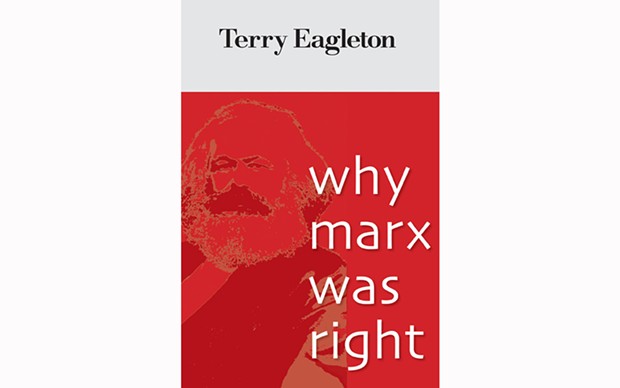[
{
"name": "Top Stories Video Pair",
"insertPoint": "7",
"component": "17087298",
"parentWrapperClass": "fdn-ads-inline-content-block",
"requiredCountToDisplay": "1"
}
]
I suspect no American academic would dare write a book with this title, for fear of losing the comforts of tenure for a cell at Guantanamo. But in the UK at least, the previously influential works of Karl Marx are being reevaluated for contemporary relevance -- especially now that capitalism is not proving to be such a utopian success. Prominent among the scholars doing so is Terry Eagleton, who has the additional advantage of not being an economist or political scientist. He teaches literature and cultural theory in England, and would be a delightful writer on any subject. But he's especially penetrating and persuasive on this one.
Eagleton begins each of his 10 chapters with a set of common charges against Marx, and evaluates and largely rebuts them. Did Marx advocate cruel totalitarian regimes? "Maoism and Stalinism were botched, bloody experiments which made the very idea of socialism stink in the nostrils of many of those elsewhere in the world who had most to benefit from it. But what about capitalism?" Genocides, imperialism, exploitation and slavery also accompany capitalism.
And now "the capitalist way of life is threatening to destroy the planet altogether." So maybe it's time to reevaluate Marx, especially since (according to Eagleton) his ideas have been intentionally and successfully distorted. (Eagleton however may not fully appreciate the dour effect of Marx's own turgid prose and that of many followers.)
Among Eagleton's contentions are that Marx saw socialism building on capitalism, that he was not wedded to violence as the agent of change, and the point of his emphasis on materialism was that in order to enjoy life, liberty and the pursuit of happiness, people need to have enough to eat. "Only then can we learn to play the banjo, write erotic poetry or paint the front porch."
Eagleton writes with erudition, clear logic and a Wildean wit. Among his conclusions about Marx: "His ideal was leisure, not labour. If he paid such unflagging attention to the economic, it was in order to diminish its power over humanity. His materialism was fully compatible with deeply held moral and spiritual convictions. He lavished praise on the middle class, and saw socialism as the inheritor of its great legacies of liberty, civil rights and material prosperity. His views on Nature and the environment were for the most part startlingly in advance of his time."
Like a lot of antiwar and antiracism agitators who were supposed to be getting our orders from Moscow back in the day, I had read very little Marx, and I still haven't. So I can't say this book has made me any more Marxist, but I am well on the way to becoming an Eagletonist.
more from the author
-
TV or Not TV?
A Comic Dilemma at NCRT
- Sep 25, 2014
-
Unequivocal Success
Shakespeare in trouble at Redwood Curtain
- Sep 11, 2014
-
A Midsummer Night's Stage
Magic worlds at Redwood Park
- Aug 14, 2014
- More »
































